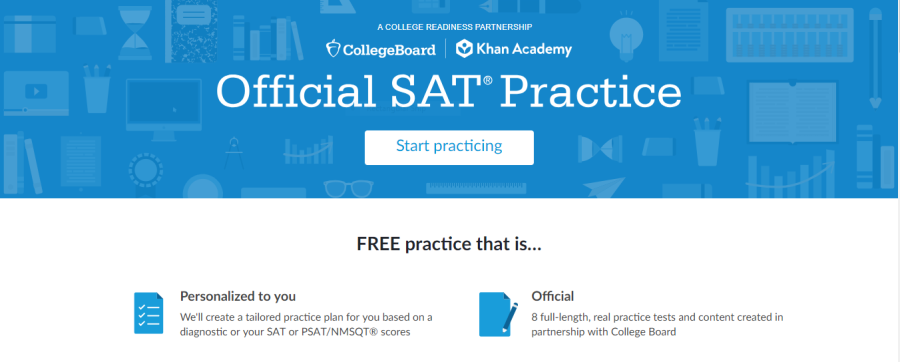SAT’S to go Digital by 2024
Khan Academy’s college readiness partnership with College Board in preparation of the SAT.
January 25, 2022
The SAT is a standardized test used as an assessment to evaluate a student’s “college specific skills.” It is one of the major tests that colleges use to determine the applicant’s potential for success in their desired major. Writing, reading, and mathematics are included in the test, not to be confused with ACT, which has an additional science section. College Board, the organization that prepares and administers standardized tests that are used in college admission and placement, owns the SAT.
It was originally created back in 1926, marking 2022 as the 95th year this test has been around. Its name and scoring have changed several times; originally called the Scholastic Aptitude Test, it was later called the Scholastic Assessment Test, then the SAT I: Reasoning Test, then the SAT Reasoning Test, then simply the SAT.
College Board recently revealed the new changes regarding the digitalized version. They will be implemented for international students in spring 2023 and for U.S. students in 2024. The duration of the test, which will be administered at schools and testing centers with proctors, will be cut from the usual three hours (nearly four including the essay section in which students can elect to participate in) down to two hours.
Students will be able to use their own devices, such as a laptop or tablet, or a school-issued device. For those without a device, College Board will provide one to use on test day. If students lose connectivity or power, they won’t lose their work or time while they reconnect. After a student has logged in to the test, its coding prevents the opening of new tabs to search online for answers. The new test also features a more user-friendly format. Long reading passages with several questions have been condensed to shorter texts with one question that reviews over a larger spectrum of topics.
Overall, 80% of U.S. and international students who took the pilot test last November said it was less stressful, said the College Board, which conducted the survey. This digital format will allow for a unique test for each student. That will increase security; however, it could raise questions about how to fairly assess students who are taking different tests.
Kirsten Amematsro, a Virginia high school sophomore who took the pilot digital test, said she much preferred the more concise reading format. “It helped me focus better and took less time because I wasn’t wasting time reading long passages scanning for the wrong answer. There’s really no difference in the hardness of the test, but there was definitely less stress, and it was easier to use,” she said.
This change comes from a growing national movement to eliminate standardized testing requirements for admissions decisions. More than 1,800 colleges and universities — nearly 80% of U.S. institutions that grant bachelor’s degrees — have dropped requirements for fall 2022 applicants, with most making submission of test scores optional, according to the educational organization FairTest, the National Center for Fair & Open Testing.
California State University, the nation’s largest four-year university system, will begin debate on whether to permanently end testing requirements during Wednesday’s meeting of the Board of Trustees, after an admission advisory council recommended doing so.
“It’s a move of the College Board into the 21st century when it comes to improving the testing experience for students,” said Kedra Ishop, USC vice president of enrollment management. “It’s going to be easier to take for students. It’s more secure and more relevant to a broader set of students. And that’s a step in the right direction.”


